
Episodes

18 minutes ago
18 minutes ago
A conversation with literary scholar Sara Gallagher about their book
Black Wests: Reshaping Race and Place in Popular Culture
(University of Oklahoma Press, 2025)
Sara Gallagher is Professor of Liberal Studies at Durham College in Ontario, Canada.

Thursday Jan 01, 2026
Thursday Jan 01, 2026
A conversation with historian Martha A. Sandweiss about their book The Girl in the Middle: A Recovered History of the American West (Princeton University Press, 2025).
Martha A. Sandweiss is Professor Emerita of History from Princeton University. A historian of the American West and photography in particular, Sandweiss is the recipient of innumerable awards and honors, served as President of the Society of American Historians and Western History Association, and was the founder of the Princeton and Slavery Project. In addition to an extensive record of articles, chapters, and sundry other publications, she is author or editor of 13 books, including:
Passing Strange: A Gilded Age Tale of Love and Deception Across the Color Line (Penguin Press, 2009)
Print the Legend: Photography and the American West (Yale University Press, 2002)
The Oxford History of the American West (Oxford University Press, 1994)
Photography in Nineteenth-Century America (Harry N. Abrams, Inc., 1991)
Eyewitness to War: Prints and Daguerreotypes of the Mexican War, 1846-1848 (Smithsonian Institution Press, 1989)
Laura Gilpin: An Enduring Grace (Amon Carter Museum, 1986)

Tuesday Dec 02, 2025
Tuesday Dec 02, 2025
A conversation with Neil Mathison about their book Airstream Country: A Geologic Journey Across the American West (University of New Mexico Press, 2025)
Neil Mathison is an award-winning author based out of the Pacific Northwest. In addition to essays published in a wide variety of outlets, he is the author of two books:
Volcano: an A to Z and Other Essays About Geology, Geography, and Geo-Travel in the American West (Bauhan Publishing, 2017)
Airstream Country: A Geologic Journey Across the American West (University of New Mexico Press, 2025)

Saturday Nov 01, 2025
Saturday Nov 01, 2025
A conversation with Mark Sundeen about their book Delusions + Grandeur: Dreamers of the New West (University of New Mexico Press, 2025)
Mark Sundeen is an award-winning novelist, essayist, and Associate Professor of Environmental Studies at the University of Montana. In addition articles for The New York Times Magazine, Outside Magazine, National Geographic Adventure, McSweeney's, and other outlets, Sundeen is the author of 5 books.
Car Camping: The Book of Desert Adventures (Quill HarperCollins, 2000)
The Making of Toro: Bullfights, Broken Hearts, and One Author's Quest for the Acclaim He Deserves (Simon & Schuster, 2003)
The Man Who Quit Money (Riverhead Books, 2012)
The Unsettlers: In Search of the Good Life in Today's America (Riverhead Books, 2018)
Delusions + Grandeur: Dreamers of the New West (University of New Mexico Press, 2025)

Wednesday Oct 01, 2025
Wednesday Oct 01, 2025
A conversation with Ernesto Sagas about their book Latino Colorado: The Struggle for Equality in the Centennial State (University Press of Colorado, 2025)
Ernesto Sagás is Professor of Ethnic Studies at Colorado State University. He is the author of an enormous body of scholarship, including articles and book chapters in a variety of disciplines, and 5 books:
Race and Politics in the Dominican Republic. University Press of Florida, 2000.
The Dominican People: A Documentary History. Co-edited with Orlando Inoa. Markus Wiener Publishers, 2003.
Dominican Migration: Transnational Perspectives. Co-edited with Sintia E. Molina. University Press of Florida, 2004.
Dominican Politics in the Twenty First Century: Continuity and Change. Co-edited with Jacqueline Jiménez Polanco. Routledge, 2023
Latino Colorado: The Struggle for Equality in the Centennial State. University Press of Colorado, 2025.

Friday Sep 12, 2025
Friday Sep 12, 2025
A conversation with historian Adam M. Sowards about their weekly Taking Bearing essays series, "Being Historically Faithful in Public" article, and broader work in public writing.
Dr. Adam Sowards is an environmental historian and writer, specializing in public lands and conservation in the US West especially the Pacific Northwest. Much of his public writings can be accessed at adamsowards.net. Dr. Sowards earned his Ph.D. in History from Arizona State University and was professor of history from the University of Idaho 2003-2022. He is now retired with emeritus status and working as a freelance writer. His published books include the following (links to purchase here):
Making America’s Public Lands: The Contested History of Conservation on Federal Lands. American Ways series, ed. John David Smith. Lanham, MD: Rowman & Littlefield, 2022.
An Open Pit Visible from the Moon: The Wilderness Act and the Fight to Protect Miners Ridge and the Public Interest. Norman: University of Oklahoma Press, 2020.
Editor. Idaho’s Place: A New History of the Gem State. Seattle: University of Washington Press, 2014.
The Environmental Justice: William O. Douglas and American Conservation. Corvallis: Oregon State University Press, 2009
United States West Coast: An Environmental History. Nature and Human Societies Series, ed. Mark Stoll. Santa Barbara: ABC-CLIO, 2007.

Tuesday Aug 12, 2025
Tuesday Aug 12, 2025
A conversation with historian Robert Sullivan about their book
Double Exposure:
Resurveying the West with Timothy O'Sullivan, America's Most Mysterious War Photographer
(Farrar, Straus and Giroux, 2024)
Robert Sullivan is a writer and journalist who has written for The New Yorker, New York Times, Vogue, and A Public Space, among other outlets. He is a New York Times bestselling author multiple times over, with titles including:
The Meadowlands: Wilderness Adventures at the Edge of a City (Knopf Doubleday, 1999)
A Whale Hunt: How a Native-American Village Did What No One Thought It Could (Scribner, 2002)
Rats: Observations on the History & Habitat of the City's Most Unwanted Inhabitants (Bloomsbury, 2005)
How Not to Get Rich: Or Why Being Bad Off Isn't So Bad (Bloomsbury, 2005)
Cross Country: Fifteen Years and 90,000 Miles on the Roads and Interstates of America with Lewis and Clark (Bloomsbury, 2006)
The Thoreau You Don't Know: What the Prophet of Environmentalism Really Meant (Harper Perennial, 2009)
My American Revolution: A Modern Expedition Through History's Forgotten Battlegrounds (Farrar, Straus and Giroux, 2013)
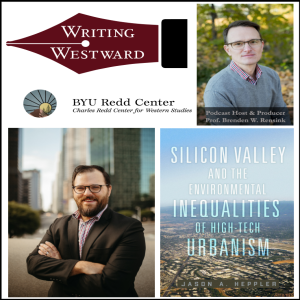
Tuesday Jul 01, 2025
Tuesday Jul 01, 2025
A conversation with historian Jason Heppler about their book
Silicon Valley and the Environmental Inequalities of High-Tech Urbanism
(University of Oklahoma Press, Environment in Modern North America Series, 2024)
Dr. Jason A. Heppler is a historian and digital historian, currently working as Senior Developer at the Roy Rosenzweig Center for History and New Media and an adjunct professor of history at George Mason University. He earned a BA in history from South Dakota State University and an MA and PhD in history from the University of Nebraska-Lincoln. Prior to his current positions at George Mason he held posts at Stanford University's Center for Spatial and Textual Analysis, Dept. of History, and Center for Interdisciplinary Digital Research, and the University of Nebraska at Omaha's Sustainability program, Libraries, and history department. He co-edited a 2020 University of Cincinnati Press volume with Rebecca Wingo, Digital Community Engagement: Partnering Communities with the Academy, which won the 2021 National Council on Public History Book Award. His first monograph, which we talk about today, Silicon Valley and the Environmental Inequalities of High-Tech Urbanism (University of Oklahoma Press, Volume 9 in the Environment in Modern North America Series, 2024).
The Writing Westward Podcast is produced and hosted by Prof. Brenden W. Rensink for the Charles Redd Center for Western Studies at Brigham Young University. Subscribe to the Writing Westward Podcast on Apple Podcasts, Stitcher, Spotify, Google Play, and other podcast distribution apps and platforms. Follow the BYU Redd Center and the Writing Westward Podcast on Facebook, Bluesky, or X/Twitter, or get more information @ https://www.writingwestward.org. Theme music by Micah Dahl Anderson @ www.micahdahlanderson.com
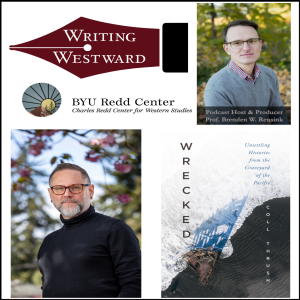
Sunday Jun 01, 2025
Sunday Jun 01, 2025
A conversation with historian Coll Thrush about their book
Wrecked: Unsettling Histories from the Graveyard of the Pacific
(University of Washington Press, 2025)
Coll Thrush is Professor of History and associate faculty in Critical Indigenous Studies at the University of British Columbia. He earned a B.A. from Fairhaven College at Western Washington University and PhD in History from the University of Washington. His first book, Native Seattle: Histories from the Crossing-Over Place (University of Washington Press, Weyerhauser Environmental Book Series, 2007) won the 2007 Washington State Book Award and came out in a 2nd edition in 2017. In 2011 Thrush and Colleen E. Boyd co-edited Phantom Past, Indigenous Presence: Native Ghosts in North American Culture and History (University of Nebraska Press, 2011). His next monograph was Indigenous London: Native Travelers at the Heart of Empire (Yale University Press, Henry Roe Cloud Series on American Indians and Modernity, 2016). Just last week, he published his new book Wrecked: Unsettling Histories from the Graveyard of the Pacific (University of Washington Press, Emil and Kathleen Sick Book Series in Western History and Biography, 2025).
The Writing Westward Podcast is produced and hosted by Prof. Brenden W. Rensink for the Charles Redd Center for Western Studies at Brigham Young University. Subscribe to the Writing Westward Podcast on Apple Podcasts, Stitcher, Spotify, Google Play, and other podcast distribution apps and platforms. Follow the BYU Redd Center and the Writing Westward Podcast on Facebook, Bluesky, or X/Twitter, or get more information @ https://www.writingwestward.org.
Theme music by Micah Dahl Anderson @ www.micahdahlanderson.com
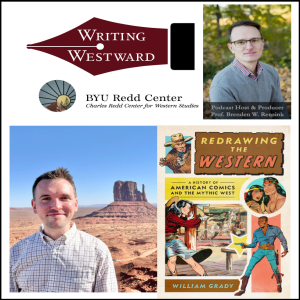
Monday May 05, 2025
Monday May 05, 2025
A conversation with scholar William Grady about their book
Redrawing the Western: A History of American Comics and the Mythic West
(University of Texas Press, 2024)
Dr. William Grady is an independent scholar and library based in the United Kingdom in Manchester. He earned a PhD in English from the University of Dundee and a masters of research and bachelors of arts in film and media studies from Manchester Metropolitan University. He held a post-doctoral research post at the University of the Arts in London, and has taught courses on comics, media theory, and film history at the University of Dundee and Manchester Metropolitan University, where he now works as a collections librarian.
The Writing Westward Podcast is produced and hosted by Prof. Brenden W. Rensink for the Charles Redd Center for Western Studies at Brigham Young University. Subscribe to the Writing Westward Podcast on Apple Podcasts, Stitcher, Spotify, Google Play, and other podcast distribution apps and platforms.
Follow the BYU Redd Center and the Writing Westward Podcast on Facebook, Bluesky, or Twitter, or get more information @ https://www.writingwestward.org.
Theme music by Micah Dahl Anderson @ www.micahdahlanderson.com
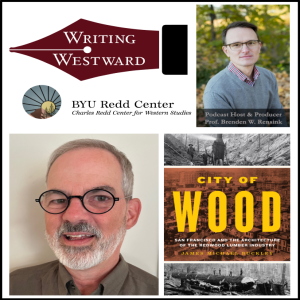
Thursday Apr 10, 2025
Thursday Apr 10, 2025
A conversation with urban planner and architectural historian James Michael Buckley about their book
City of Wood:
San Francisco and the Architecture of the Redwood Lumber Industry
(University of Texas Press, 2024)
James Michael Buckley is an urban planner, recently retired from the University of Oregon where he was an associate professor and venerable chair in historic preservation, and the director of the historic preservation program in the School of Architecture and Environment. Previously, he held teaching positions at MIT, San Francisco State University, and the University of California Berkley, where he earned an MA in city and regional planning and a PhD in architecture. He also holds a BA in Art History and American Studies from Yale University.
The Writing Westward Podcast is produced and hosted by Prof. Brenden W. Rensink for the Charles Redd Center for Western Studies at Brigham Young University. Subscribe to the Writing Westward Podcast on Apple Podcasts, Stitcher, Spotify, Google Play, and other podcast distribution apps and platforms.
Follow the BYU Redd Center and the Writing Westward Podcast on Facebook, Bluesky, or Twitter, or get more information @ https://www.writingwestward.org.
Theme music by Micah Dahl Anderson @ www.micahdahlanderson.com
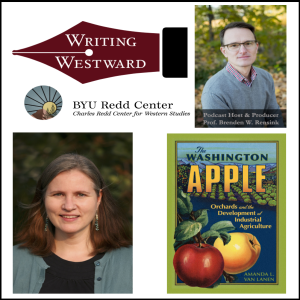
Monday Mar 03, 2025
Monday Mar 03, 2025
A conversation with historian Amanda Van Lanen about their book
The Washington Apple: Orchards and the Development of Industrial Agriculture
(University of Oklahoma Press, 2022).
Amanda L. Van Lanen is Professor of History and Humanities Division Chair at Lewis-Clark State College. A historian of the American West, agriculture, and the environment, you can follow her regular blog posting about "cookbooks, stories, and recipes from the back of the fridge," at https://historyreheated.com/.
The Writing Westward Podcast is produced and hosted by Prof. Brenden W. Rensink for the Charles Redd Center for Western Studies at Brigham Young University. Subscribe to the Writing Westward Podcast on Apple Podcasts, Stitcher, Spotify, Google Play, and other podcast distribution apps and platforms.
Follow the BYU Redd Center and the Writing Westward Podcast on Facebook, Bluesky, or Twitter, or get more information @ https://www.writingwestward.org.
Theme music by Micah Dahl Anderson @ www.micahdahlanderson.com
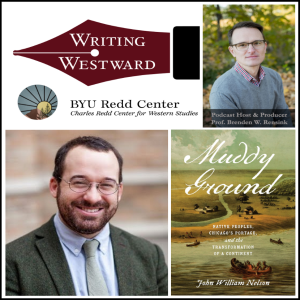
Saturday Feb 01, 2025
Saturday Feb 01, 2025
A conversation with historian John William Nelson about their book,
Muddy Ground: Native Peoples, Chicago's Portage, and the Transformation of a Continent
(University of North Carolina Press, 2023)
John William Nelson is assistant professor of history at Texas Tech University, where he teaches courses on Colonial America, the American West, the Atlantic World, and Native American history. He holds a PhD in history from the University of Notre Dame. In addition to a couple book chapters in Routeledge anthologies, Nelson published award-winning articles in the Michigan Historical Review in 2019 and William and Mary Quarterly in 2021. His 2023 book that we discuss today, Muddy Ground: Native Peoples, Chicago's Portage, and the Transformation of a Continent (University of North Carolina Press, David J. Weber Series in the New Borderlands History Series, 2023). It won the 2024 W. Turrentine-Jackson Prize (Western History Association), 2024 Superior Achievement Award (Illinois State Historical Society), an Honorable Mention for the 2024 Jon Gjerde Book Award (Midwestern History Association), and was a Shortlist Award Recipient for the 2024 Pattis Family Foundation Chicago Book Award (The Newberry Library).
The Writing Westward Podcast is produced and hosted by Prof. Brenden W. Rensink for the Charles Redd Center for Western Studies at Brigham Young University. Subscribe to the Writing Westward Podcast on Apple Podcasts, Stitcher, Spotify, Google Play, and other podcast distribution apps and platforms.
Follow the BYU Redd Center and the Writing Westward Podcast on Facebook, Bluesky, or Twitter/X, or get more information @ https://reddcenter.byu.edu and https://www.writingwestward.org.
Theme music by Micah Dahl Anderson @ www.micahdahlanderson.com
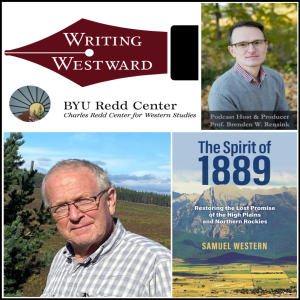
Thursday Jan 09, 2025
Thursday Jan 09, 2025
A conversation with journalist, author, and poet Samuel Western about his book,
The Spirit of 1889: Restoring the Lost Promise of the High Plains and Northern Rockies
(University Press of Kansas, 2024)
Samuel Western is a prolific journalist and writer of the American West. In addition to having taught various courses on Wyoming history and culture at the University of Wyoming in past years, he was a correspondent for the Economist for over 30 years, published in the Wall Street Journal, LIFE, Sports Illustrated, High Country News, Montana: the Magazine of Western History, and other outlets. Western won two Wyoming Literary Fellowships, once for poetry and once for fiction, and is the author of the book Pushed Off The Mountain, Sold Down the River; Wyoming’s Search For Its Soul (Homestead Publishing, 2002), the prose poetry collection A Random Census of Souls (Daniel & Daniel Publishers, 2015), which was finalist for best poetry book 2010 by the High Plains Book Awards, the novel Canyons (Daniel & Daniel Publishers, 2015), which was also published in French in 2017, and most recently, the book The Spirit of 1889: Restoring the Lost Promise of the Great Plains and Northern Rockies (University Press of Kansas, 2024).
The Writing Westward Podcast is produced and hosted by Prof. Brenden W. Rensink (www.bwrensink.org) for the Charles Redd Center for Western Studies at Brigham Young University and hosted by. Subscribe to the Writing Westward Podcast on Apple Podcasts, Stitcher, Spotify, Google Play, and other podcast distribution apps and platforms. Follow the BYU Redd Center and the Writing Westward Podcast on Facebook, Bluesky or Twitter/X or get more information @ https://www.writingwestward.org. Theme music by Micah Dahl Anderson @ www.micahdahlanderson.com
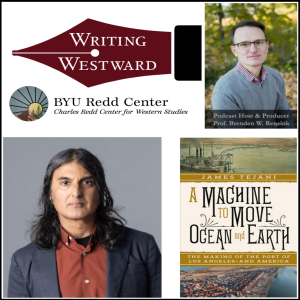
Monday Dec 09, 2024
Monday Dec 09, 2024
A conversation with historian James Tejani about their book
A Machine to Move Ocean and Earth:
The Making of the Port of Los Angeles—and America
(W. W. Norton, 2024)
James Tejani is associate professor of history at California Polytechnic State University. He holds a BAs in history and political science from the University of California, San Diego, and a Ph.D. in History from Columbia University. His first book, A Machine to Move Ocean and Earth: The Making of the Port of Los Angeles—and America (W. W. Norton, 2024). A decade ago he published two articles from this project, both of which won awards. His Southern California Quarterly article, “Dredging the Future: The Destruction of Coastal Estuaries and the Creation of Metropolitan Los Angeles, 1858-1913,” won the Doyce B. Nunis Jr. Award from the Historical Society of Southern California and the Ray Allen Billington Prize from the Western History Association, and his Western Historical Quarterly article, “Harbor Lines: Connecting the Histories of Borderlands and Pacific Imperialism in the Making of the Port of Los Angeles, 1858-1908,” earned an honorable mention for the Alice Hamilton Prize from the American Society for Environmental History.
The Writing Westward Podcast is produced and hosted by Prof. Brenden W. Rensink (www.bwrensink.org) for the Charles Redd Center for Western Studies at Brigham Young University (reddcenter.byu.edu). Subscribe to the Writing Westward Podcast on Apple Podcasts, Stitcher, Spotify, Google Play, and other podcast distribution apps and platforms. Follow the BYU Redd Center and the Writing Westward Podcast on Facebook, Bluesky or Twitter/X or get more information @ https://www.writingwestward.org. Theme music by Micah Dahl Anderson @ www.micahdahlanderson.com
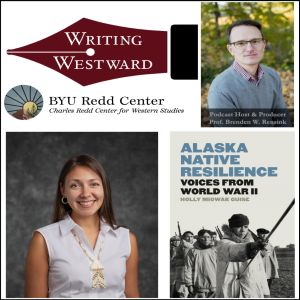
Monday Nov 04, 2024
Monday Nov 04, 2024
A conversation with historian Holly Miowak Guise about her book, Alaska Native Resilience: Voices from World War II (University of Washington Press, Indigenous Confluences Series, 2024).
Dr. Guise is Assistant Professor of History at the University of New Mexico and holds a BA in Native American Studies from Stanford University and an MA and PhD in History from Yale University. She is the author of multiple books chapters and a 2022 article in the WHQ, “Who is Doctor Bauer?: Rematriating a Censored Story on Internment, Wardship, and Sexual Violence in Wartime Alaska, 1941-1944, " which won the Western History Association's Arrell M. Gibson Award for the best essay of the year on the history of Native Americans, Jensen-Miller Award for the best article in the field of women and gender in the North American West, Vicki L. Ruiz Award for best article on race in the North American West, and Oscar O. Winther Award for best article published in the Western Historical Quarterly (2023), and the Western Association of Women Historians Judith Lee Ridge Prize for best article in the field of history (2024). In 2022 she received both an American Council of Learned Societies and Ford Foundation Postdoctoral Fellowship to aid in her research that culminated in her book. Check out the book's companion website, ww2alaska.com to sample some of the oral history interviews that formed a foundation for her work.
The Writing Westward Podcast is produced and hosted by Prof. Brenden W. Rensink (www.bwrensink.org) for the Charles Redd Center for Western Studies at Brigham Young University. Subscribe to the Writing Westward Podcast on Apple Podcasts, Stitcher, Spotify, Google Play, and other podcast distribution apps and platforms. Follow the BYU Redd Center and the Writing Westward Podcast on Facebook, Bluesky or Twitter/X or get more information @ https://www.writingwestward.org. Theme music by Micah Dahl Anderson @ www.micahdahlanderson.com
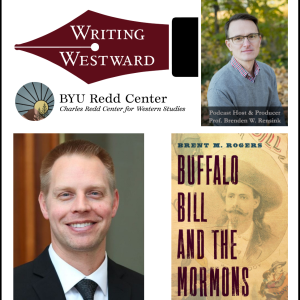
Monday Oct 21, 2024
Monday Oct 21, 2024
A conversation with historian Brent M. Rogers their book Buffalo Bill and the Mormons (Bison Books / University of Nebraska Press, 2024).
Brent M. Rogers is the Managing Historian of the LDS Church History Department in Salt Lake City. He holds a Ph.D. in history from the University of Nebraska-Lincoln, an M.A. in Public History from the California State University - Sacramento, and BA in history from San Diego State University. One of his first publications, a 2014 Utah Historical Quarterly article on Mormons and Federal Indian Policy won the WHA's Arrington-Prucha Prize for the Best Article on the History of Religion in the West. His first book, Unpopular Sovereignty: Mormons and the Federal Management of Early Utah Territory (NU 2017) won the 2018 Best First Book Award from the Mormon History Association, 2018 Francis Armstrong Madsen Best Book Award from the Utah State Historical Society, and the Charles Redd Center Phi Alpha Theta Book Award for the Best Book on the American West. He has authored and edited numerous other pieces, book chapters, and volumes, and is an editor on 6 volumes of the Joseph Smith Papers, many of which have also won awards.
The Writing Westward Podcast is produced and hosted by Prof. Brenden W. Rensink (https://www.bwrensink.org) for the Charles Redd Center for Western Studies at Brigham Young University (reddcenter.byu.edu). Subscribe to the Writing Westward Podcast on Apple Podcasts, Stitcher, Spotify, Google Play, and other podcast distribution apps and platforms. Follow the BYU Redd Center and the Writing Westward Podcast on Facebook or Twitter or get more information @ https://www.writingwestward.org.
Theme music by Micah Dahl Anderson @ www.micahdahlanderson.com
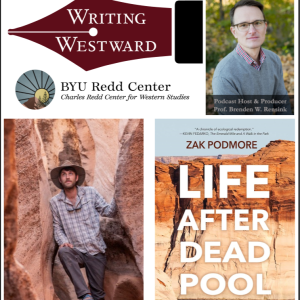
Friday Sep 06, 2024
Friday Sep 06, 2024
A conversation with journalist and author Zak Podmore about their book, Life After Dead Pool: Lake Powell's Last Days and the Rebirth of the Colorado River (Torrey House Press, 2024). In addition to stories for the Salt Lake Tribune, Podmore also published Confluence: Navigating the Personal & Political on Rivers of the New West (Torrey House Press, 2019).
Podcast Notes:
Host and Producer Brenden W. Rensink is Associate Director of the Redd Center, Professor of History at BYU, General Editor of the Intermountain Histories project, and author of the 2018 book Native but Foreign: Indigenous Immigrants and Refugees in the North American Borderlands.
Support provided by the Charles Redd Center for Western Studies at Brigham Young University.
Podcast Music was written and recorded by local Provo composer by Micah Dahl Anderson.
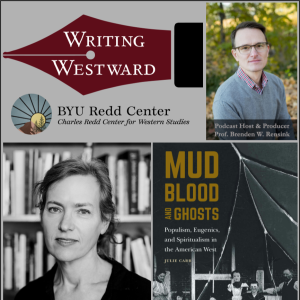
Friday May 03, 2024
Friday May 03, 2024
A conversation with poet and author Julie Carr about their book, Mud, Blood, and Ghosts: Populism, Eugenics, and Spiritualism in the American West (University of Nebraska Press, 2023).
Julie Carr is Professor of English at the University of Colorado, Boulder and Chair of the Department of Women and Gender Studies. Her training and degrees from Barnard College, NYU, and the University of California, Berkeley are in creative writing, poetry, and English. She is the author of 16 books, many of which have won awards and honors. She has also published extensively in journals, poetry collections, popular outlets like The New Republic, High Country News, The Nation, and others. She has traveled extensively to give readings, is involved in multi-media projects, and is co-host and co-creator of the brand new podcast, Return the Key: Jewish Questions for Everyone.
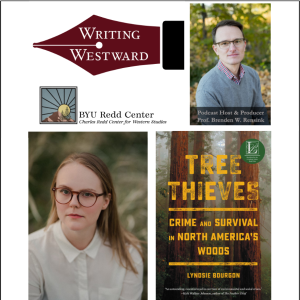
Friday Apr 05, 2024
Friday Apr 05, 2024
A conversation with journalist Lyndsie Bourgon about her book, Tree Thieves: Crime and Survival in North America's Woods (Little, Brown Spark, 2022).
Lyndsie Bourgon is a journalist, author, oral historian, fellow of the Royal Canadian Geographical Society, and National Geographic Explorer. Her work intersects the environment, history, culture, identity, and more and has appeared in venues such as National Geographic Magazine, Smithsonian Magazine, Maisonneuve, Hazlitt, The Atlantic, The Walrus, The Guardian, and others. Many of those pieces were winners of or finalists for awards and honors. Her book, Tree Thieves: Crime and Survival in North America's Woods (Little, Brown Spark, 2022) has received considerable positive press and the following honors:
Long-listed: The PEN America/Kenneth R. Galbraith Award for Non-fiction
Short-listed: The Columbia University/Nieman Foundation J. Anthony Lukas Award
Finalist: The 2022 Banff Mountain Book Competition Environmental Literature Award
Honourable Mention: The Society of Environmental Journalists’ Rachel Carson Environment Book Award
Finalist: The BC and Yukon Book Prizes, Hubert Evans Non-Fiction Award
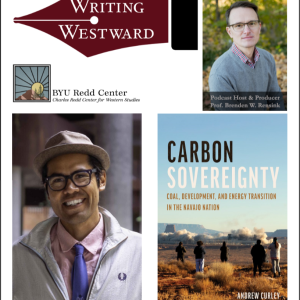
Friday Mar 01, 2024
Friday Mar 01, 2024
A conversation with geographer Andrew Curley about his book, Carbon Sovereignty: Coal, Development, and Energy Transition in the Navajo Nation (University of Arizona Press, 2023).
Andrew Curley is a member of the Navajo Nation and an Assistant Professor in the School of Geography, Development and Environment at the University of Arizona. His book, Carbon Sovereignty: Coal, Development, and Energy Transition in the Navajo Nation was published by the University of Arizona Press in 2023. He holds a B.A. in sociology from Suffolk University and an M.A. and Ph.D. in Development Sociology from Cornell University. Before joining the faculty at the University of Arizona, he held a postdoctoral research fellowship and was an Assistant Professor in the Department of Geography at the University of North Carolina at Chapel Hill.
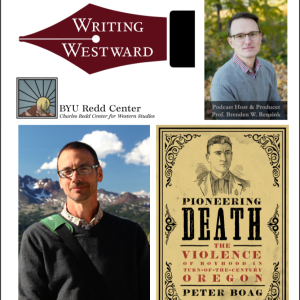
Friday Feb 02, 2024
Friday Feb 02, 2024
A conversation with historian Peter Boag about their book Pioneering Death: The Violence of Boyhood in Turn-of-the-Century Oregon (University of Washington Press, 2022).
Peter Boag is Professor and Columbia Chair in the History of the American West at Washington State University. He is a historian of gender, sexuality, the environment, and culture in the American West and the Pacific Northwest. Along with countless articles, essays, and chapters, he is the author of four monographs: Environment and Experience: Settlement Culture in Nineteenth-Century Oregon (University of California Press, 1992), Same-Sex Affairs: Constructing and Controlling Homosexuality in the Pacific Northwest (University of California Press, 2003), Re-Dressing America’s Frontier Past (University of California Press, 2011), and Pioneering Death: The Violence of Boyhood in Turn-of-the-Century Oregon (University of Washington Press, 2022).
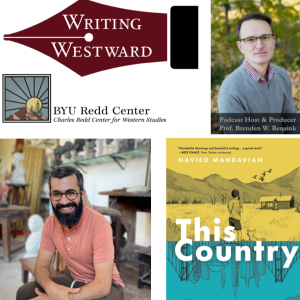
Friday Jan 26, 2024
Friday Jan 26, 2024
A conversation with cartoonist Navied Mahdavian about his graphic novel memoir, This Country: Searching for Home in (Very) Rural America (Princeton Architectural Press, 2023).
Navied Mahdavian is is a cartoonist and writer whose work has appeared in the New Yorker since 2018. You may have also seen his work in Readers Digest, Wired, and elsewhere.
Find him at @naviedm on Instagram, on his substack ToonStack, or his at https://www.naviedm.com/.
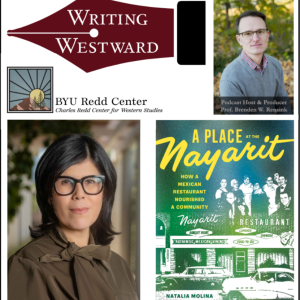
Friday Dec 01, 2023
Friday Dec 01, 2023
A conversation with historian Natalia Molina about their book A Place at the Nayarit: How a Mexican Restaurant Nourished a Community (University of California Press, 2022).
Natalia Molina is Distinguished Professor of American Studies and Ethnicity and Dean's Professor of American Studies and Ethnicity at the University of Southern California. In 2020 she was named a MacArthur Fellow. Her most recent book, A Place at the Nayarit: How a Mexican Restaurant Nourished a Community (University of California Press, 2022). It will be released in paperback in early 2024 and a 30% discount code will be included in a forthcoming edition of Molina's newsletter. Subscribe at https://nataliamolinaphd.com/. The book has received the following accolades:
Armitage-Jameson Prize 2023, Coalition for Western Women’s History
David J. Weber Prize 2023, Western History Association
John G. Cawelti Best Book Award 2023, Popular Culture Association
Emily Toth Award (Best Single Work) Honorable Mention, Popular Culture Association
James Beard Award (Reference, History, and Scholarship) Finalist 2023, James Beard Foundation
PROSE Award North American & US History Finalist 2023, Association of American University Presses
Porchlight Business Book Awards (Narrative & Biography) Longlist 2022, Porchlight Book Company
Prior to this, Molina was the author of the award-winning books Fit to Be Citizens? Public Health and Race in Los Angeles, 1879–1939 (University of California Press, 2006), How Race Is Made in America: Immigration, Citizenship, and the Historical Power of Racial Scripts (University of California Press, 2014), and coeditor of Relational Formations of Race: Theory, Method, and Practice (University of California Press, 2019).
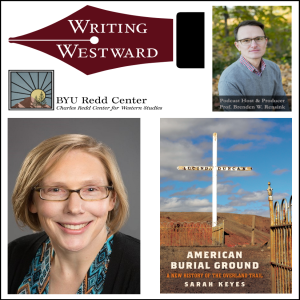
Friday Nov 03, 2023
Friday Nov 03, 2023
A conversation with Sarah Keyes about their book American Burial Ground: A New history of the Overland Trail (University of Pennsylvania Press, 2023).
Sarah Keyes is an assistant professor of history at the University of Nevada, Reno. She earned her PhD from the University of Southern California and studies the intercultural relations between Indigenous and Euro-American peoples. After securing publications of articles in field-defining outlets like the Journal of American History and the Western Historical Quarterly, she published her first book, which we discuss today, American Burial Ground: A New history of the Overland Trail (University of Pennsylvania Press, America in the Nineteenth Century Series, 2023).
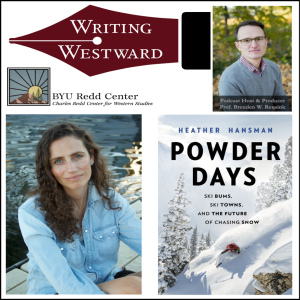
Friday Oct 06, 2023
Friday Oct 06, 2023
A conversation with Heather Hansman about their book Powder Days: Ski Bums, Ski Towns, and The Future of Chasing Snow (Hanover Square Press, 2021).
Heather Hansman is the author of Powder Days: Ski Bums, Ski Towns, and The Future of Chasing Snow (Hanover Square Press, 2021, paperback, 2023), and Downriver: Into the Future of Water in the West. She's a contributing editor at Outside magazine, and an award-winning journalist whose work appears in places like the Atlantic and the New York Times. She lives in Durango, Colorado, where she's working on her next book, Fierce Country, which is about underrepresented women in the outdoors.
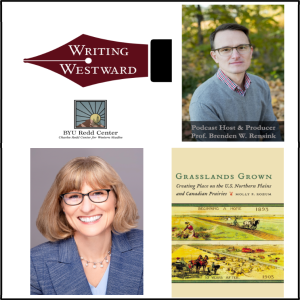
Friday Sep 22, 2023
Friday Sep 22, 2023
A conversation with historian Molly P. Rozum about their new book, Grasslands Grown: Creating Place on the U.S. Northern Plains and Canadian Prairies (University of Nebraska Press & University of Manitoba Press, 2021).
Molly P. Rozum is associate professor of history and the Ronald M. Nelson Distinguished Professor and Chair of Great Plains and South Dakota History at the University of South Dakota. She holds degrees in American Studies, Folklore, and History. She is editor, co-editor, and author of multiple books and articles on Plains history. Her most recent book is Grasslands Grown: Creating Place on the U.S. Northern Plains and Canadian Prairies (University of Nebraska Press & University of Manitoba Press, 2021).
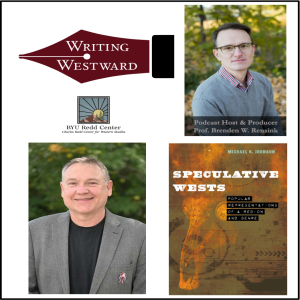
Tuesday Aug 01, 2023
Tuesday Aug 01, 2023
A conversation with literary scholar Michael K. Johnson about their book, Speculative Wests: Popular Representations of a Region and Genre (University of Nebraska Press, 2023).
Michael K. Johnson is Professor of American literature at the University of Maine at Farmington. His primary research areas are African American Literature and the literature and culture of the American West.
Johnson's other works include:
Black Masculinity and the Frontier Myth in American Literature (University of Oklahoma Press, 2002)
Hoo-Doo Cowboys and Bronze Buckaroos: Conceptions of the African American West (University Press of Mississippi, 2015)
Can’t Stand Still: Taylor Gordon and the Harlem Renaissance (University Press of Mississippi, 2019)
Weird Westerns: Race, Gender, Genre (University of Nebraska Press, 2020)
A Black Woman’s West: The Life of Rose B. Gordon (Montana Historical Society Press, 2022)
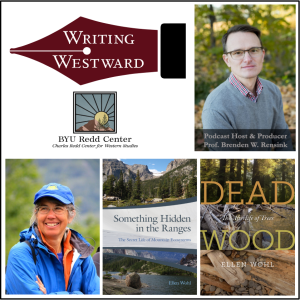
Monday Jul 03, 2023
Monday Jul 03, 2023
A conversation with geoscientist Ellen Wohl about their books, Something Hidden in the Ranges: The Secret Life of Mountain Ecosystems and Dead Wood: The Afterlife of Trees (Oregon State University Press, 2021 and 2022).
Dr. Ellen Wohl is a University Distinguished Professor in the Department of Geosciences at Colorado State University.
Selected additional titles by Wohl include:
Rain Forest Into Desert: Adventures in Australia's Tropical North (University of Colorado Press, 1994)
Inland flood hazards: Human, Riparian, and Aquatic Communities (Cambridge University Press, 2000)
Virtual Rivers: Lessons from the Mountain Rivers of the Colorado Front Range (Yale University Press, 2001)
Island of Grass (University of Colorado Press, 2009)
Of Rocks and Rivers: Seeking a Sense of Place in the American West (University of California Press, 2009)
Mountain Rivers Revisited (American Geophysical Union, 2010)
A World of Rivers: Environmental Change on Ten of the World's Great Rivers (University of Chicago Press, 2011)
Disconnected Rivers: Linking Rivers to Landscapes (Yale University Press, 2012)
Wide Rivers Crossed: The South Platte and the Illinois of the American Prairie (University of Colorado Press, 2013)
Rivers in the Landscape: Science and Management (Wiley-Blackwell, 2014)
Transient Landscapes: Insights on a Changing Planet (University of Colorado Press, 2015)
Rhythms of Change in Rocky Mountain National Park (University of Kansas Press, 2016)
Saving the Dammed: Why We Need Beaver-Modified Ecosystems (Oxford University Press, 2019)
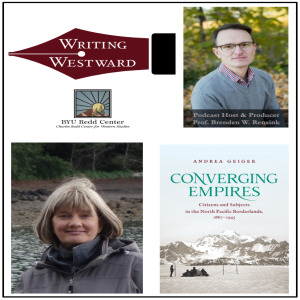
Thursday Jun 01, 2023
Thursday Jun 01, 2023
A conversation with Andrea Geiger about their new book, Converging Empires: Citizens and Subjects in the North Pacific Borderlands, 1867-1945 (University of North Carolina Press, 2023).
Andrea Geiger is professor emerita of history from Simon Frasier University in British Columbia. With an international childhood spent in Japan, the Netherlands, India, and elsewhere, she had a successful first career as an attorney, culminating with a position representing the Confederated Tribes of the Coleville Reservation in NE Washington State. Inspired by her upbringing, she then earned a PhD in history from UW. Her first book, Subverting Exclusion Transpacific Encounters with Race, Caste, and Borders, 1885-1928 (Yale University Press, 2011). Today we talk about her recent and second book, Converging Empires: Citizens and Subjects in the North Pacific Borderlands, 1867-1945 (University of North Carolina Press, 2023).
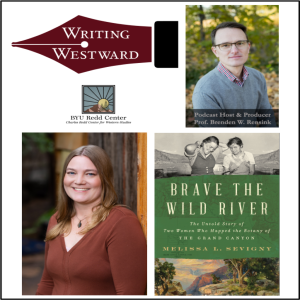
Tuesday May 23, 2023
Tuesday May 23, 2023
A conversation with Melissa L. Sevigny about their book Brave the Wild River: The Untold Story of Two Women Who Mapped the Botany of the Grand Canyon (W. W. Norton, 2023).
Melissa L. Sevigny is a science journalist at the Arizona Public Radio station KNAU in Flagstaff. Her writing intersects science, nature, and history, with a focus on the American southwest. She earned a BS in Environmental Science and Policy from the University of Arizona and an MFA in Creative Writing and Environment from Iowa State University. In her new book, Brave the Wild River: The Untold Story of Two Women Who Mapped the Botany of the Grand Canyon (W.W. Norton, 2023), Sevigny relates the story of two remarkable scientists who took part in a successful rafting expedition through the Grand Canyon to study its botany. Their pioneering botanical discoveries were historic but the media at the time focuses primarily on a different historic aspect of their trip - they were the first two women to successfully raft the oft-treacherous waters.
Along with numerous shorter pieces of writing and journalism, Sevigny has published two other books: Under Desert Skies: How Tucson Mapped the Way to the Moon and Planets (University of Arizona Press, 2016) and Mythical River: Chasing the Mirage of New Water in the American Southwest (University Iowa Press, 2016). The latter of the two was honored with multiple awards. Her shorter-form writings and journalism have also received awards and honors.
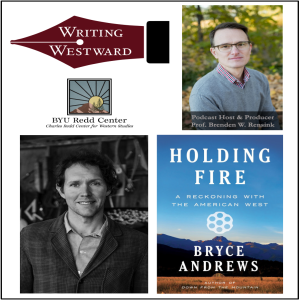
Monday Apr 03, 2023
Monday Apr 03, 2023
A conversation with Bryce Andrews about their book, Holding Fire: A Reckoning with the American West (Mariner Books, Harper Collins imprint, 2023).
Bryce Andrews is an award-winning author originally from Seattle but who has spent the majority of his adult life as a rancher and farmer in western Montana. His first book, Badluck Way: A Year on the Ragged Edge of the West (Atria Books, Simon & Schuster imprint, 2014) won the Barnes & Noble Discover Great New Writers Award, the Reading the West Book Award for nonfiction, and the High Plains Book Award for both nonfiction and debut book. His second book, Down from the Mountain: The Life and Death of a Grizzly Bear (Mariner Books, Harper Collins imprint, 2020) won the Banff Mountain Book Competition, and was a Montana Book Award honor Title and the Amazon Best Science title of 2019. Andrews' new book is Holding Fire: A Reckoning with the American West (Mariner Books, Harper Collins imprint, 2023). Learn more about Andrews at his website https://www.bryceandrews.com.
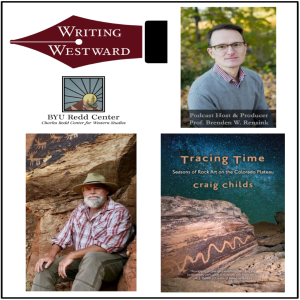
Friday Mar 17, 2023
Friday Mar 17, 2023
A conversation with Craig Childs about their book, Tracing Time: Seasons of Rock Art on the Colorado Plateau (Torrey House Press, 2022).
Craig Childs is a multiple-award winning author with more than a dozen books (and countless shorter pieces) on outdoor adventures, wilderness, and science to his name. You can find information on his other books and writings at his website, www.houseofrain.com.
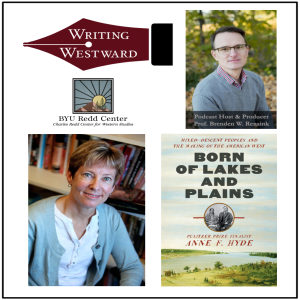
Friday Feb 10, 2023
Friday Feb 10, 2023
A conversation with Anne F. Hyde about her book, Born of Lakes and Plains: Mixed-Descent Peoples and the Making of the American West (W. W. Norton, 2022).
Anne Hyde is Professor of History at the University of Oklahoma and Editor-in-Chief of the Western Historical Quarterly.
Some of her other publications include:
The West in the History of the Nation, vols 1 & 2, co-edited with William F. Deverell (Bedfords/St. Martins, 2020)
Shaped by the West: A history of North America, vols. 1 & 2, co-edited with William F. Deverell (University of California Press, 2018)
Empires, Nations, and Families: A New History of the North American West, 1800-1860 (University of Nebraska Press, 2012)
An American Vision: Far Western Landscape and American Culture, 1820-1920 (New York University Press, 1990)
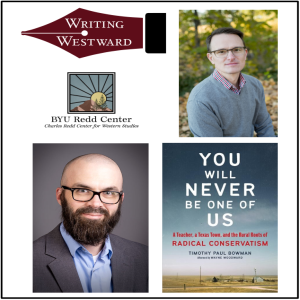
Friday Jan 13, 2023
Friday Jan 13, 2023
A conversation with Timothy Paul Bowman about his book You Will Never be One of Us: A Teacher, A Texas Town, and the Rural Roots of Radical Conservatism (University of Oklahoma Press, 2022).
Timothy Paul Bowman is Associate Professor History and Chair of the Department of History at West Texas A&M University where has also helped adminsiter the Center for the Study of the American West. Bowman earned a bachelor’s degree from Texas Christian University in 2002, a masters degree from the University of Texas – Arlington in 2005, and a Ph.D. from Southern Methodist University in 2011. In 2016 he published Blood Oranges: Agriculture and Racial Difference in the Texas-Mexico Borderlands, 1900-1975 (Texas A&M University Press).
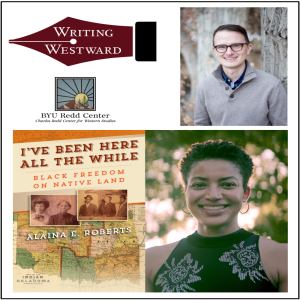
Friday Dec 09, 2022
Friday Dec 09, 2022
A conversation with Prof. Alaina E. Roberts about her book, I’ve Been Here All the While: Black Freedom on Native Land (University of Pennsylvania Press, 2021).
Alaina E. Roberts is an Assistant Professor of History at the University of Pittsburgh, where she studies the intersection of Black and Native American life from the Civil War to the modern day. Dr. Roberts is the author of I’ve Been Here All the While: Black Freedom on Native Land (University of Pennsylvania Press, 2021), which was awarded the Stubbendieck Great Plains Distinguished Book Prize from the Center for Great Plains Studies at the University of Nebraska, the John Ewers Award for the Best Book on North American Indian Ethnohistory and W. Turrentine-Jackson Award for the Best First Book from the Western History Association, the Phillis Wheatley Book Award, in the Historical Era category, granted by the Sons and Daughters of the United States Middle Passage, and was a finalist the L.A. Times Book Prizes in the History Category and the Gilder Lehrman Lincoln Prize, granted by the Gilder Lehrman Institute of American History and Gettysburg College. Dr. Roberts has written multiple academic essays as well as op-eds and profiles for the Washington Post, TIME magazine, and High Country News.
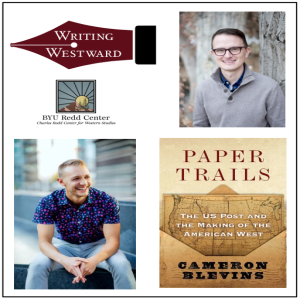
Friday Nov 04, 2022
Friday Nov 04, 2022
A conversation with Prof. Cameron Blevins about his recent book, Paper Trails: The US Post and the Making of the American West (Oxford University Press, 2021), and his associated digital history and mapping website, Gossamer Network.
Cameron Blevins is associate professor in the History Department at the University of Colorado Denver. He is a historian and a leader in the growing field of digital history. In his recent book, Paper Trails: The US Post and the Making of the American West was published by Oxford University Press in 2021. The book is accompanied by a website, Gossamer Network, where you can view maps and data visualizations relevant to the project, like the one seen below.
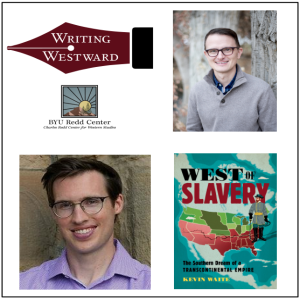
Wednesday Oct 26, 2022
Wednesday Oct 26, 2022
A conversation with historian Kevin Waite about his award-winning book, West of Slavery: The Southern Dream of a Transcontinental Empire (University of North Carolina Press, 2021).
Kevin Waite is an assistant professor of history at Durham University in the United Kingdom. His 2021 book, West of Slavery: The Southern Dream of a Transcontinental Empire won the 2022 Wiley-Silver Prize from the Center for Civil War Research and was a finalist for the Gilder Lehrman Lincoln Prize from the Gilder Lerhman Institute of American History.
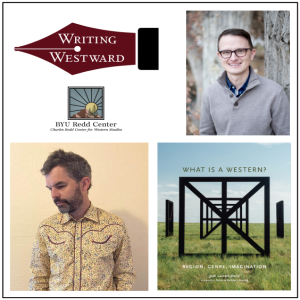
Friday Sep 09, 2022
Friday Sep 09, 2022
A conversation with Josh Garrett-Davis about his essay collection, What is a Western? Region, Genre, Imagination (University of Oklahoma Press, 2019).
Josh Garrett-Davis is the Gamble Associate Curator at the Autry Museum of the American West, author of multiple books and many public-facing shorter articles and pieces. He collected some of these, and penned a number more, for his richly illustrated essay collection, What is a Western? Region, Genre, Imagination (University of Oklahoma Press, 2019).
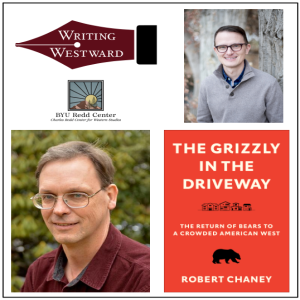
Wednesday Aug 31, 2022
Wednesday Aug 31, 2022
A conversation with Robert Chaney about is book, The Grizzly in the Driveway: The Return of Bears to a Crowded American West (University of Washington Press, 2020).
Robert Chaney is a journalist based in Montana and the managing editor of one of the region’s major newspapers, The Missoulian. Much of his work in the past decades has focused on the environment and the thorny issues of managing our public lands and resources in the West. In his new book, The Grizzly in the Driveway: The Return of Bears to a Crowded American West (University of Washington Press, 2020)., Chaney traces the recent history of Grizzly Bear reintroductions to different regions in the Northern Rockies, the complicated intersecting issues of the ACTUAL role they play in their ecosystems, and the fears we have about them, imagined malicious personalities we project on them, and resulting politics that often overshadow science in policy-making concerning their management. As an apex predator of immense size and with immense destructive and deadly capacities, Grizzly Bear encounters are not something to be taken lightly. However, as Chaney illustrates from various angles, successful balancing of ecological needs and human activities in the Mountain West must be driven by more than our fear of them. With more and more people venturing into Grizzly habitats for recreation, work, or residence, these are issues that must be weighed carefully. Chaney helps us start a number of these crucial conversations.
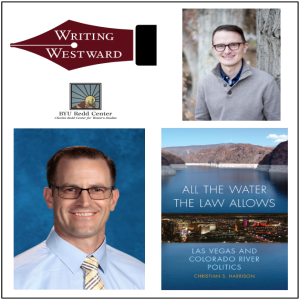
Friday Jul 01, 2022
Friday Jul 01, 2022
A conversation with historian Christian S. Harrison about his book, All the Water the Law Allows: Las Vegas and Colorado River Politics (University of Oklahoma Press, 2021).
Christian S. Harrison is an environmental historian in Nevada. He hold a PhD in History from the University of Nevada Las Vegas, teaches government at Coronado High School in Henderson, NV, and is a board member of the nonprofit Preserve Nevada, where he works to engage public school teachers in historic preservation efforts throughout the state. His book that we discuss today, All the Water the Law Allows: Las Vegas and Colorado River Politics, was published by the University of Oklahoma Press in 2021 in their "The Environment in Modern North America Series."
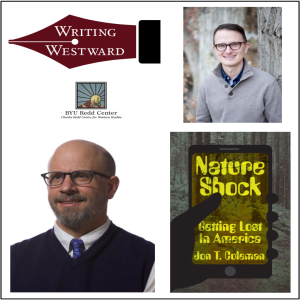
Friday Jun 10, 2022
Friday Jun 10, 2022
A conversation with historian Jon T. Coleman about his book, Nature Shock: Getting Lost in America (Yale University Press, 2020).
Jon T. Coleman is the Andrew V. Tackes College Professor of History at the University of Notre Dame. He his author of three books, the multiple-award winning Vicious: Wolves and Men in America (Yale University Press, 2004), Here Lies Hugh Glass: A Mountain Man, a Bear, and the Rise of the American Nation (Hill & Wang, 2012), and Nature Shock: Getting Lost in America (Yale University Press, 2020).
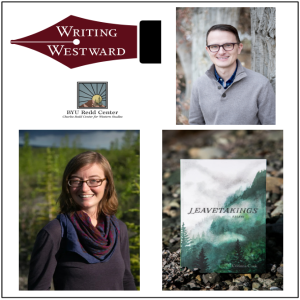
Friday May 13, 2022
Friday May 13, 2022
A conversation with Corinna Cook about her collection, Leavetakings: Essays (University of Alaska Press, 2020).
Corinna Cook is a former Fulbright Fellow, an Alaska Literary Award recipient, and a Rasmuson Foundation awardee. She has a Ph.D. in English and Creative Writing from the University of Missouri. Her collection of essays, Leavetakings: Essays, was published in 2020 by the University of Alaska Press in their Alaska Literary Series.
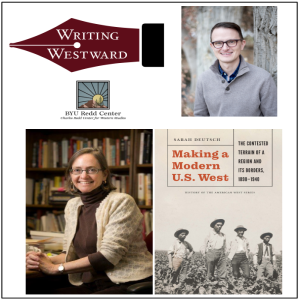
Wednesday Apr 27, 2022
Wednesday Apr 27, 2022
A conversation with Sarah Deutsch about her book, Making a Modern U.S. West: The Contested Terrain of a Region and its Borders, 1898-1940 (University of Nebraska Press, 2022).
Sarah Deutsch is a professor of history at Duke University. Her book, Making a Modern U.S. West: The Contested Terrain of a Region and its Borders, 1898-1940, was published by the University of Nebraska Press in 2022 in the "History of the American West Series." Deutsch is also the author of Women and the City: Gender, Space and Power in Boston, 1870-1940 (Oxford University Press, 2000), From Ballots to Breadlines: American Women, 1920-1940 (Oxford University Press, 1994), and No Separate Refuge: Culture, Class, and Gender on an Anglo-Hispanic Frontier in the American Southwest, 1880-1940 (Oxford University Press, 1987).
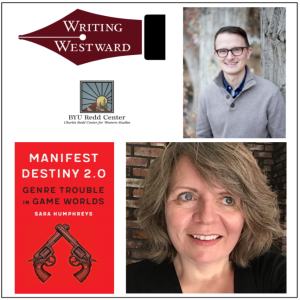
Friday Mar 11, 2022
Friday Mar 11, 2022
A conversation with Sara Humphreys about her book, Manifest Destiny 2.0: Genre Trouble in Game Worlds (University of Nebraska Press, 2021).
Dr. Sara Humphreys is an assistant teaching professor of English at the University of Victoria in British Columbia, Canada. She holds a BA at Nipissing University in English, my MA at the University of Toronto in English, and my PhD at the University of Waterloo in English Language and Literature. Her most recent book, Manifest Destiny 2.0: Genre Trouble in Game Worlds was published by the University of Nebraska Press in the Postwestern Horizons Series in 2021.
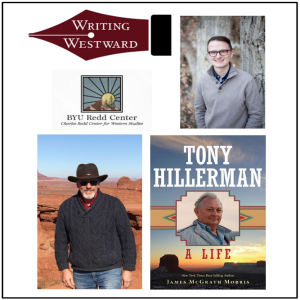
Friday Feb 04, 2022
Friday Feb 04, 2022
A conversation with James McGrath Morris about his new biography, Tony Hillerman: A Life (University of Oklahoma Press, 2021).
James McGrath Morris is a biographer and writer of narrative non-fiction. His biographies have been more than well-received, boasting a New York Times best-seller, winner of the Benjamin Hooks National Book Prize, and titles that the Wall Street Journal and Washington Post listed among the best books and biographies of the year. Today we talk about his most recent biography, Tony Hillerman: A Life, published by the University of Oklahoma Press in 2021.
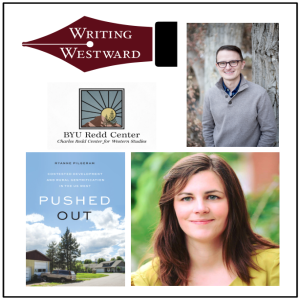
Monday Jan 31, 2022
Monday Jan 31, 2022
A conversation with Ryanne Pilgeram about her new book, Pushed Out: Contested Development and Rural Gentrification in the US West, published by the University of Washington Press in 2021.
Ryanne Pilgeram is Associate Professor of Sociology at the University of Idaho.
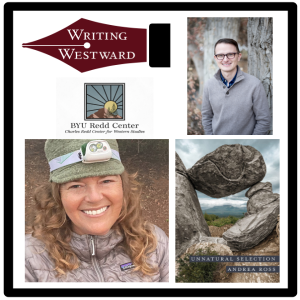
Monday Aug 09, 2021
Monday Aug 09, 2021
A conversation with Andrea Ross about her new book, Unnatural Selection: A Memoir of Adoption and Wilderness (CavanKerry Press, 2021).
Andrea Ross is a writer who currently teaches in the University Writing Program at the University of California at Davis. Her writing has appeared in various popular outlets and has been supported by fellowships and awards from the California Arts Council, the Mesa Refuge, and other organization. In earlier years she worked as a National Parks Service ranger and a wilderness guide. In 2021 CavanKerry Press published her book, Unnatural Selection: A Memoir of Adoption and Wilderness, which we are speaking about today. In this memoir Ross relates formative experiences in the outdoors and wilderness of the American West. With the perspective of hindsight, she weaves these together with the concurrent life events she had as an adoptee searching for her biological family. She sees how outdoor Western spaces provided her with a sense of belonging, identity, and family as she searched for her biological roots. It is an intimate and vulnerable exhibition that invites all of us to pause and reevaluate our relationship with the outdoors and explore what unexpected roles it has played in our own life journeys.
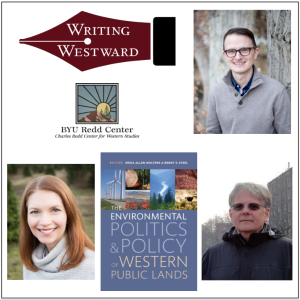
Friday Jul 02, 2021
Friday Jul 02, 2021
A conversation with Erika Wolters and Brent Steel about their edited collection The Environmental Politics & Policy of Western Public Lands (Oregon State University Press, 2020).
Erika Allen Wolters (PhD, Oregon State University) is an Assistant Professor of Political Science and Associate Director of the Public Policy Undergraduate Program in the School of Public Policy at Oregon State University. Her research focuses on environmental behavior, adaptation and policy in response to resource use and conservation in an era of rapid climate change. Focusing primarily on the Western United States, Dr. Wolters examines the interface of science and policy, public lands issues, community resilience, contested natural resources, sustainable behavior, adaptive capacity, and policy regarding food, energy, and water.
Brent S. Steel (PhD, Washington State University) is Professor of Political Science and Director of the Public Policy Graduate Program at Oregon State University, which offers the Master of Public Policy, Executive Master of Public Policy, and the PhD in Public Policy. He teaches courses in science policy, public policy theory, rural policy, climate change politics, and energy policy. Professor Steel is also on the founding and executive boards for Vote Smart (https://votesmart.org), a nonpartisan and nonprofit voter education organization.
Their collection of essays, The Environmental Politics & Policy of Western Public Lands was published by Oregon State University Press in 2020 but is also available digitally for free (and will be as they update it in the future) via OSU Open Educational Resources. This collection features writers from the fields of political science, public policy, environmental science, the law, and others. It is an excellent primer on a variety of intersecting topics that is powerful as a collection. Together, they demonstrate how interconnected our Western environmental problems (and solutions) are. The individual chapters are also valuable as stand-alone pieces.
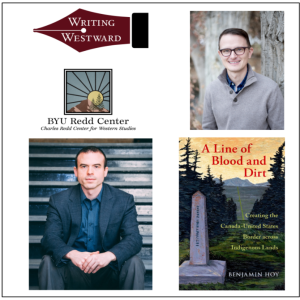
Tuesday Jun 01, 2021
Tuesday Jun 01, 2021
A conversation with historian Benjamin Hoy about his book A Line of Blood and Dirt: Creating the Canada-United States Border across Indigenous Lands (Oxford University Press, 2021).
Benjamin Hoy is an Associate Professor of History and the director of the Historical GIS Lab at the University of Saskatchewan. He has published on a wide range of topic including Indigenous history, borderlands, game-based learning, Indigenous representations in board games, and extradition policy. Today we discuss his first book, A Line of Blood and Dirt: Creating the Canada-United States Border across Indigenous Lands (Oxford University Press, 2021). In it, Hoy examines the creation and enforcement of the Canadian-United States border between 1775 and 1939 and its impacts on the Indigenous residents whose land the border was created across. Rather than a dry administrative history of the border's creation, Hoy's text is driven by a focus on the lived experiences of the people at the border. The cast of characters is diverse and some of the stories are wild.
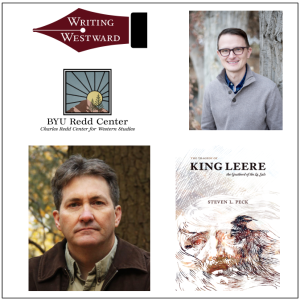
Friday May 07, 2021
Friday May 07, 2021
A conversation with Steven L. Peck about his novel The Tragedy of King Leere, the Goatherd of the La Sals (By Common Consent Press, 2019).
Steven L. Peck is an evolutionary biologist and associate professor in the College of Life Sciences at Brigham Young University. In addition to being a widely-published scholar in genomics, entomology, mathematical modeling, and other associated fields, Peck moonlights as a writer of creative fiction, non-fiction, poetry, and essays. These writings range from religion to the environment, and from magic realism to science fiction. Many are set in the American West, especially around his hometown landscapes of Moab, Utah. His novels and shorter works have won numerous awards. Most recently, the Association for Mormon Letters recognized his body of work with the 2021 Smith-Pettit Foundation Award for Outstanding Contribution to Mormon Letters.
Peck's most recent novel, The Tragedy of King Leere, the Goatherd of the La Sals (By Common Consent Press, 2019) is an adaption of Shakespeare's King Leare. On the one hand, the outlines of the adaption are quite faithful to the original, but the futuristic setting in a post-apocalyptic American West are wildly inventive. Shakespeare couldn't have imagined the mega-droughts, military-grade sentient murder robots, transgenic goats with human skin, or post-war geopolitically fractured American West that Peck uses to retell the story of Leere's descent into madness. In Peck's adaption, Leere is a goat rancher of global significance, based in the La Sal Mountains outside of Moab, Utah. In spinning Leere's tale in this wild setting, Peck points us to dangers apparent in our present American West - greed, climate change, indifference to human impact on environment and ecology, and our desperate dependence on the same. Casting our eyes to a future West - however fantastical and bizarre - Peck offers a warning voice of tragedies we should and CAN avoid.
Other works of note by Peck include:
The Scholar of Moab (Torrey House Press, 2011)
A Short Stay in Hell (Strange Violin Editions, 2012)
Evolving Faith: Wanderings of a Mormon Biologist (Neal A. Maxwell Institute for Religious Scholarship, 2015)
Gilda Trillim: Shepherdess of Rats (Roundfire Books, 2017)
Find more about Peck's work at http://www.stevepeckniche.com.
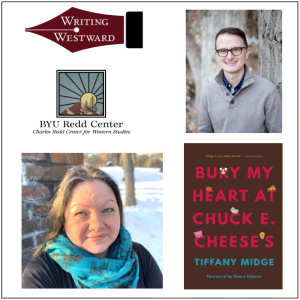
Friday Apr 16, 2021
Friday Apr 16, 2021
A conversation with author Tiffany Midge about her book, Bury My Heart at Chuck E. Cheese's (University of Nebraska Press, 2019)
Tiffany Midge is a citizen of the Standing Rock Sioux tribe and was raised in the Pacific Northwest. She is a former columnist for Indian Country Today, has written for McSweeney's, Lit Hub, World Literature Today, and other publications, and taught writing and composition at Northwest Indian College. She is the author of the award-winning books The Woman who Married a Bear: Poems and Outlaws, Renegades and Saints: Diary of a Mixed-Up Halfbreed, and contributor many others.
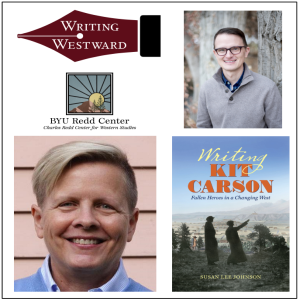
Monday Mar 01, 2021
Monday Mar 01, 2021
A conversation with Prof. Susan Lee Johnson about her new book, Writing Kit Carson: Fallen Heroes in a Changing West (University of North Carolina Press. 2020).
Dr. Susan Lee Johnson is the inaugural Harry Reid Endowed Chair for the History of the Intermountain West in the Department of History at the University of Nevada, Las Vegas with faculty affiliations in Gender and Sexuality Studies and Latinx and Latin American Studies. In 2021 Johnson serves as the President of the Western History Association. Johnson is a historian of the North American West and its borderlands, specializing in the studies of gender, race, ethnicity, and indigeneity. In addition to producing edited volumes and articles, her book Roaring Camp: The Social World of the California Gold Rush (Norton, 2000) won the W. Turrentine Jackson Prize from the Western History Association and Bancroft Prize. Johnson’s scholarship has been recognized by various organizations with other awards, fellowships, and grants. Her recent book, Writing Kit Carson: Fallen Heroes in a Changing West was published by the University of North Carolina Press in 2020.
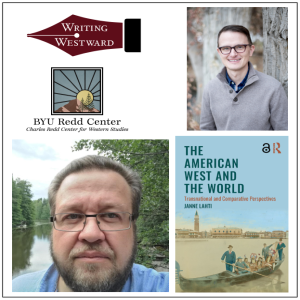
Thursday Feb 04, 2021
Thursday Feb 04, 2021
A conversation with Dr. Janne Lahti about his book The American West and the World: Transnational and Comparative Perspectives (Routledge: 2019)
Dr. Janne Lahti teaches history at the University of Helsinki, is an Academy of Finland Research Fellow, and the editor of the journal American Studies in Scandinavia. Today we talk about his 2019 book The American West and the World: Transnational and Comparative Perspectives (Routledge, 2019). Rather than a project based in new archival work, this text is a useful synthetic overview of a variety of topics and drawing from a robust literature of recent scholarship. By offering a brief birds-eye view of ways in which the American West can be viewed through its transnational connections or comparative perspectives, Lahti asks us to take nearly every conceivable "Western" story we know and consider how it likely fit into global contexts that we often overlook. Viewing Western histories as unfolding in tight connection with global worlds promises new understandings of the past, and perhaps more importantly, better understandings of our present globalized Western lives.
Lahti is also the author or editor of:
Cinematic Settlers: The Settler Colonial World in Film (Routledge, 2020)
Soldiers in the Southwest Borderlands, 1848-1886 (University of Oklahoma Press, 2017)
Wars for Empire: Apaches, the United States, and the Southwest Borderlands (University of Oklahoma Press, 2017)
Cultural Construction of Empire: The U.S. Army in Arizona and New Mexico (University of New Mexico Press, 2012)
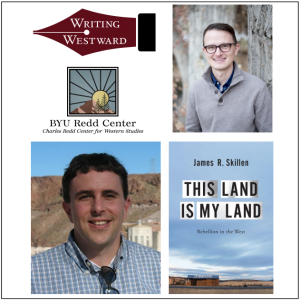
Tuesday Jan 12, 2021
Tuesday Jan 12, 2021
A conversation with Dr. James R. Skillen about his book This Land is My Land: Rebellion in the West (Oxford University Press, 2020).
James R. Skillen is Associate Professor of Environmental Studies at Calvin University. His new book, This Land is My Land: Rebellion in the West was published in 2020 by Oxford University Press. Skillen is also author The Nation's Largest Landlord: The Bureau of Land Management in the American West (University of Kansas Press, 2009) and Federal Ecosystem Management: Its Rise, Fall, and Afterlife (Kansas University Press, 2015). Building on these previous works on the history of the federal land management in the West, Skillen has now turned his eye to understanding the recent politics of land management, how certain Westerners have resisted federal oversight and regulations, and how very regional Western debates over grazing permits and local control over land use have melded with national movements against the federal government and increasingly extremist and militant stands against supposed federal tyranny. The growing overlap between those protesting federal land management policies, so-called "patriot" groups, anti-government militias, extreme conspiracy theorists, and white nationalists makes understanding the historical context of their Western elements essential. Unfortunately, Skillen's book is timely and demands attention.
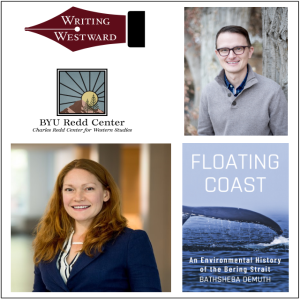
Wednesday Dec 16, 2020
Wednesday Dec 16, 2020
A conversation with Dr. Bathsheba Demuth about her book Floating Coast: An Environmental History of the Bering Strait (WW Norton, 2019).
Bathsheba Demuth is Assistant Professor of History at Brown University.
Popular and academic organizations have praised Floating Coast in rare fashion. Nature named it a Top 10 book for 2019, NPR, Library Journal, Barnes & Noble, and Kirkus Review named it a best book of 2019, and it was a New York Times "Editor's Choice" pick for the year as well. On the academic side, Floating Cost won the 2020 George Perkins Marsh Prize from the American Society for Environmental History for the best book in environmental history, the 2020 Hal K. Rothman Book Prize for the best book in western environmental history and the W. Turrentine Jackson Book Prize for best first book from the Western History Association, the 2020 Eric Zencey Prize in Ecological Economics from the University of Vermont Foundation, the 2020 Julia Warde Howe prize in nonfiction from the Boston Authors Club, the 2020 William Mills Prize as the best non-fiction Polar book from the Polar Libraries Colloquy, and was a finalist for the Pushkin House Russian Book Prize, an honorable mention for the Rachel Carson Book Prize, and longlisted for the Cundill History Prize.
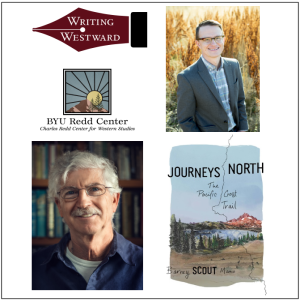
Friday Nov 13, 2020
Friday Nov 13, 2020
A conversation with hiker and author Barney Scout Mann about his book Journey's North: The Pacific Crest Trail (Mountaineer Books, 2020).
Barney Mann, known on the trails as "Scout," is avid hiker, writer, and storyteller. Having completed the 2,650 mil Pacific Crest Trail, the 3,100 mile Continental Divide Trail, both of which span from Mexico to Canada, and the 2,190 mile Appalachian Trail which stretches from Maine to Georgia, he is one of the few in the long-distance thru-hiking world to boast triple-crown status. In addition to putting in miles on the trail and writing about them, he has made significant contributions to the outdoors community by serving as board President of the Partnership for the National Trails System, Board Chair of the Pacific Crest Trail Association, President of the Continental Divide Trail Coalition, and by hosting, along with his wife Sandy, THOUSANDS of hikers to sleep a night or two at their SoCal home in preparation for embarking on the PCT. Explore more about Mann at his website, www.barneyscoutmann.com.
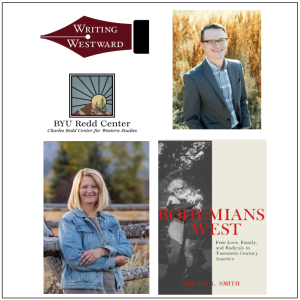
Friday Oct 23, 2020
Friday Oct 23, 2020
A conversation with Sherry L. Smith about her book Bohemians West: Free Love, Family, and Radicals in Twentieth-Century America (Hey Day Books, 2020). Explore more at www.sherrylsmith.com.
Sherry L. Smith is University Distinguished Professor of History (Emerita) at Southern Methodist University. In Bohemians West: Free Love, Family, and Radicals in Twentieth-Century America (Hey Day Books, 2020), Smith tells the story of the interwined lives of Sara Bard Field and Erskine Scott Wood, who were married to others when they met in 1910 in Portland, but negotiated and built a life together on the philosophy of free love, mutual respect for one another, and shared passions for poetry and politics. Smith is a master historian and grounds Bohemians West in expert research, but she gracefully narrates a story with such literary grace that readers might forget the rigorous methodology hiding beneath the surface. Thus, general readers will be captivated by an engaging narrative of intimately details lives, and historians will rejoice in finding a carefully-researched told with such literary flare.
Explore more of Smith's work at www.sherrylsmith.com. Some is also author or editor of the following titles:
Sagebrush Soldier: Private William Earl Smith's View of the Sioux War of 1876 (University of Oklahoma Press, 1989)
The View from Officer's Row: Army Perceptions of Western Indians (University of Arizona Press, 1990)
Reimagining Indians: Native Americans through Anglo Eyes, 1880-1940 (Oxford University Press, 2000)
The Future of the Souther Plains (University of Oklahoma Press, 2003)
Indians and Energy: Exploitation and Opportunity in the American Southwest (School for Advanced Research Press, 2010)
Hippies, Indians, and the Fight for Red Power (Oxford University Press, 2014)

Friday Sep 04, 2020
Friday Sep 04, 2020
A conversation with Kenneth F. Dewey, Dan O'Brien, and Larkin Powell about their books in the University of Nebraska Press "Discover the Great Plains" series, Great Plains Weather (2019), Great Plains Bison (2017), and Great Plains Birds (2019).
Ken Dewey is professor emeritus of geography and climatology at the University of Nebraska - Lincoln. He maintains the Lincoln Weather and Climate website and provides a regular Weather segment on local Nebraska radio station, KLIN.
Dan O'Brien is a wildlife ecologist, essayist, novelist, educator and rancher. He runs the Wild Idea Buffalo Company, raising buffalo in South Dakota with eye towards preserving and restoring Great Plains grasslands.
Larkin Powell is professor of wildlife ecology at the University of Nebraska - Lincoln. His research ranges from quantitative methods for determining wildlife demographics, wildlife and ecology policy and decision make, the environmental histories of Great Plains, and even poetry.
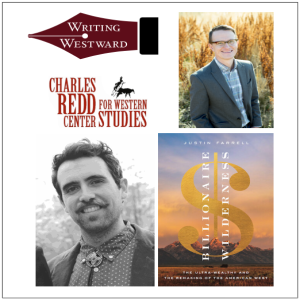
Friday Aug 21, 2020
Friday Aug 21, 2020
A conversation with sociologist Justin Farrell about his book, Billionaire Wilderness: The Ultra-Wealthy and the Remaking of the American West (Princeton University Press, 2020).
Justin Farrell is associate professor of Sociology in the Yale School of the Environment.
He is also the author of The Battle for Yellowstone: Morality and the Sacred Roots of Environmental Conflict, published by Princeton University Press in 2015.
To view the new research on COVID-19 in the rural west, mentioned at the end of this episode, visit www.CovidRuralWest.org.
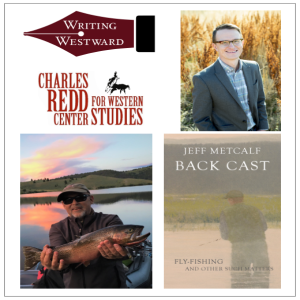
Tuesday Jul 21, 2020
Tuesday Jul 21, 2020
A discussion about the late Jeff Metcalf 's book, Back Cast: Fly-Fishing and Other Such Matters (University of Utah Press, 2018), along with a handful of experiences from host Brenden Rensink.
Jeff Metcalf was assistant professor of English at the University of Utah. He was an award-winning essayist and playwright, and an avid fly-fisher.
Sadly, he passed away the very week we were set to record an interview about his latest book, Back Cast: Fly-Fishing and Other Such Matters. Still wanting to share his writings, I restructured this episode to work as best as it could. I share some of the questions I wanted to ask Jeff, read some passages from Back Cast that evoked something in me, and shared a handful of my own stories that Jeff's fly-fishing tales made me think of. It is a bit unconventional and features much more of me than I am usually comfortable with, but I hope it serves as a modest tribute to Jeff's literary work.
Jeff's obituary can be viewed here.
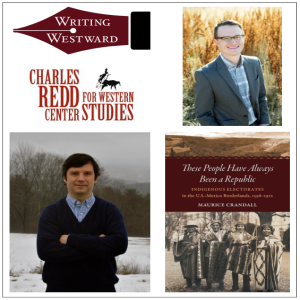
Monday Jun 08, 2020
Monday Jun 08, 2020
A conversation with Professor Maurice Crandall about his book, These People Have Always Been a Republic: Indigenous Electorates in the U.S.-Mexico Borderlands, 1598-1912 (University of North Carolina Press, 2019).
Maurice Crandall is a member of the Yavapai-Apache Nation of Camp Verde Arizona and Assistant Professor of Native American Studies at Dartmouth College. He holds a Ph.D. in History from the University of New Mexico and has received multiple honors, awards, and fellowships for his scholarship. Prior to his position at Dartmouth College, Crandall was the Clements Fellow for the Study of Southwestern America at the William P. Clements Center for Southwest Studies at Southern Methodist University, and a Historical Projects Specialist at the Indian Pueblo Cultural Center in Albuquerque, New Mexico.
These People Have Always Been a Republic: Indigenous Electorates in the U.S.-Mexico Borderlands, 1598-1912 was published in 2019 by the University of North Carolina Press in their David J. Weber Series in New Borderlands History.
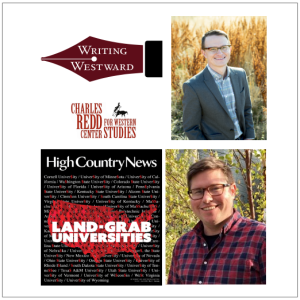
Wednesday May 13, 2020
Wednesday May 13, 2020
A conversation with historian Dr. Robert Lee about his High Country News article "Land-grab Universities" and companion website, landgrabu.org.
Dr. Robert Lee is a University Lecturer in American History at the University of Cambridge. He earned is Ph.D. in History from US Berkeley and has a long list of awards and honors to his name. At the end of March 2020, he and journalist Tristan Ahtone published an article with High Country News entitled "Land-grab Universities" and released a companion digital history website landgrabu.org that provide data vizualizations to accompany the article.
This multi-year project examined the Indigenous lands that were used to fund the establishment of Land-Grant Universities around the nation. In the American West, many universities continue to generate revenue for these lands. This work pairs with the growing movement in higher education to study how institutions benefited from slavery in their early years, but it perhaps more universal in scope and relevance. It reveals how the sale of Native lands - especially in the West - were central to the founding of state universities. It reminds us that the lands used to endow public universities were not simply a "donation" from the federal government to the states. They represented millions of acres of recently, and often violently, expropriated Indigenous lands. The project was funded in part by the Pulizter Center and Fund for Invetigative Journalism.
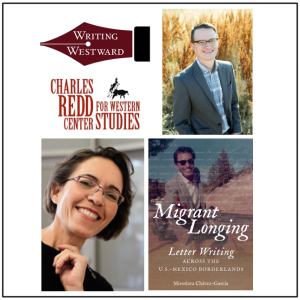
Friday Apr 03, 2020
Friday Apr 03, 2020
A conversation with author Miroslava Chávez-García about her book, Migrant Longing: Letter Writing across the U.S.-Mexico Borderlands (University of North Carolina Press, 2018).
Miroslava Chavez-Garcia is a Professor of History at the University of California, Santa Barbara, with affiliations in the Departments of Chicana/o Studies and Feminist Studies. She is an award winning scholar, widely praised for her intersecting the study of gender, race, immigration, incarceration, borderlands, and family. Her books include Negotiating Conquest: Gender and Power in California, 1770s to 1880s (University of Arizona Press, 2004), States of Delinquency: Race and Science in the Making of California’s Juvenile Justice System (University of California Press, 2012), and Migrant Longing: Letter Writing across the U.S.-Mexico Borderlands (University of North Carolina Press, 2018).
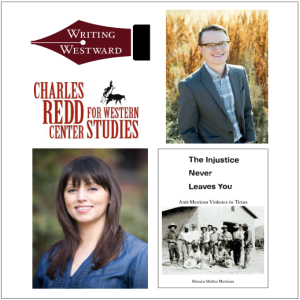
Monday Mar 16, 2020
Monday Mar 16, 2020
A conversation with author Monica Muñoz Martinez about her book, The Injustice Never Leaves You: Anti-Mexican Violence in Texas, published in 2018 by Harvard University Press.
Monica Munoz Martinez is the Stanley J. Bernstein Assistant Professor of American Studies at Brown University, an award winning author, and engaged public historian. She is the primary investigator for Mapping Violence, a digital project that documents histories of racial violence in Texas, and a founding member of Refusing to Forget, a non-profit organization that calls for a public reckoning with racial violence in Texas. Her first book, The Injustice Never Leaves You: Anti-Mexican Violence in Texas (Harvard University Press Sept 2018) was awarded the Lawrence Levine Award from the Organization of American Historians; Caughey Western History Prize and the Robert G. Athearn Award from the Western History Association; the Best Non-Fiction Book Award from the National Association for Chicano Chicana Studies Tejas FOCO; the TCU Texas Book Award from TCU Press and Friends of the TCU Library; and was a finalist for the Fredrick Jackson Turner Award from the Organization of American Historians.
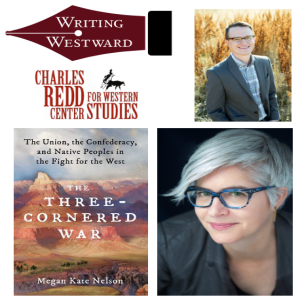
Friday Feb 07, 2020
Friday Feb 07, 2020
A conversation with writer and historian Megan Kate Nelson about her new book, The Three-Cornered War: The Union, the Confederacy, and Native Peoples in the Fight for the West (Scribner Books, 2020).
Megan Kate Nelson is a writer and historian of the American Civil War, American West, popular culture, and the 19th century more broadly.
Nelson's new book, The Three-Cornered War: The Union, the Confederacy, and Native Peoples in the Fight for the West (Scribner, 2020), unfolds in the American Southwest, pulling our gaze of the U.S. Civil War away from Eastern battlefields. In New Mexico and Arizona Nelson explores the interconnected actions of the Confederacy, the Union, and sovereign Native peoples. Each group projected conflicting plans and desires for the region.
For the Union and Confederacy, their actions in the SW were about empire and the westward expansion of either free-soil and free-labor for the north or slave economies for the south. For Native peoples, the conflict was in defense of homelands and resources and defiance against growing American empires and ambitions. So while most Civil War battles were in the east, they were fought BECAUSE of the West and competing aspirations projected there. When the Union and Confederate conflict ends in the southwest, Nelson smartly continues to follow the story as Union warfare in the region do not cease, but shifts to Native peoples. This reminds us that in the southwest and elsewhere, the Civil War was more complex than a simple North-South conflict. It was expansionist and imperial in origin, and continental in scope.
Nelson writes in a fluid narrative style and most chapters present the perspective of individual historical figures. This makes the text delightfully readable. It is academic rigorous history, disguised almost as a novel.
Nelson has written extensively in academic and public venues, and her previous books include Trembling Earth: A Cultural History of the Okefenokee Swamp (University of Georgia Press, 2005) and Ruin Nation: Destruction and the American Civil War (University of Georgia Press, 2012). Nelson earned a BA in History and literature from Harvard, a PhD in American Studies from the University of Iowa, and has taught on those topics at Texas Tech, California State - Fullerton, Harvard, and Brown.
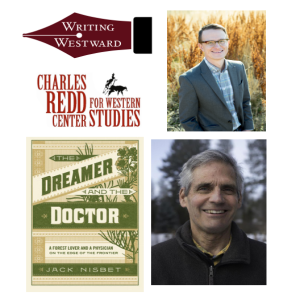
Friday Jan 24, 2020
Friday Jan 24, 2020
A conversation with author Jack Nisbet about his dual-biography,The Dreamer and the Doctor: A Forest Lover and a Physician on the Edge of the Frontier, published in 2018 by Sasquatch Books.
Jack Nisbet lives and works with his wife Claire in Spokane. He has authored several collections of essays that explore the human and natural history of the Northwest, award-winning biographies of cartographer David Thompson (Sources of the River) and naturalist David Douglas (The Collector), and additional illustrated volumes. In 2018, the Washington State Historical Society presented Nisbet with the Robert Gray medal for distinguished and long-term contributions to Pacific Northwest history.
The Dreamer and the Doctor: A Forest Lover and a Physician on the Edge of the Frontier, published in 2018 by Sasquatch Books, relates the biographies of John and Carrie Leiberg and their late-19th and early-20th century experiences in the interior Pacific Northwest. John Leiberg was a would-be miner, turned botanist, naturalist, scientist, and government forestry employee. His reports on forest reserves, ecology, and other related fields were impressive in scope, detail, and influence. Carrie was a surgeon and physician who rose to regional prominence in her profession, published nationally on obstetrics, became politically active, and entertained entrepreneurial dreams. Their lives offer a fascinating glimpse into an oft-ignored region, stage of "frontier" development, and era of scientific discovery.
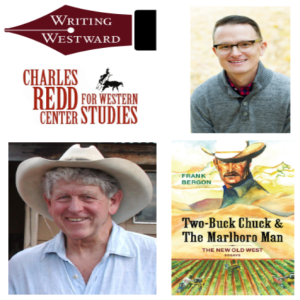
Friday Dec 06, 2019
Friday Dec 06, 2019
A conversation with Frank Bergon about his 2019 collection of essays, Two-Buck Chuck and the Marlboro Man: The New Old West (University of Nevada Press, 2019)
Frank Bergon is Professor Emeritus of English at Vassar College. He is a novelist, essayist, and critic of the American West, and member of the Nevada Writers Hall of Fame. His new collection of essays, Two-Buck Chuck and the Marlboro Man: The New Old West, was published by University of Nevada Press in 2019. These essays focus on the San Joaquin Valley in California, bringing its history and present into conversation with one another. Bergon tells stories of the region's inhabitants, their experiences in seemingly traditional "Old West" contexts, and their grappling with "New West" economies and socio-cultural devleopments. In these stories we discover "wesern" identities that overlap, compete, and meld. Bergon uses the story of wine industry figure Fred Franzia to consider how individuals and industries navigate a region in constant transition. Bergon deconstructs western "identity" and iconic imagery through stories of his life-long friend Darrell Winfield - the real-life cowboy made famous in iconic "Marlboro Man" advertisements. Bergon presents vignettes from Winfield's life to illustrate the tensions between imagined, manufactured, and actual regional identities and lives. Bergon's eloquent storytelling reveals the complexity of the region and asks insightful questions about how we think about its past and present.
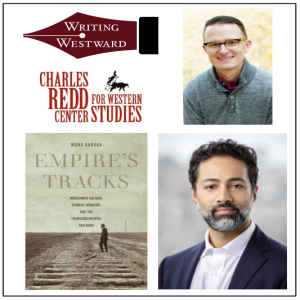
Friday Nov 01, 2019
Friday Nov 01, 2019
A conversation with Prof. Manu Karuka about his 2019 book, Empire's Tracks: Indigenous Nations, Chinese Workers, and the Transcontinental Railroad (University of California Press, 2019)
Manu Karuka is Assistant Professor of American Studies, and affiliated faculty with Women’s, Gender & Sexuality Studies at Barnard College. Empire's Tracks: Indigenous Nations, Chinese Workers, and the Transcontinental Railroad was published by the University of California Press in 2019 in their "American Crossroads" series.
Empire's Tracks takes familiar histories of American westward expansion and transcontinental railroad construction and retells them through the often missing contexts of captialism, finance, and what Karuka terms a "military-finance nexus." Viewed as "continental imperialism," Karuka shows how the entreprises of expansion, military conquest, and capitalist enterprise were intertwined and that their continental extension unfolded over colonized territories, not American homelands. By featuring histories of how Natives peoples and Chinese laborers experienced the transcontinetnal railroad story, Empire's Tracks expands our view of history. Integrations of global economic networks, political and economic philosophy, and post-colonial literature and theory offer a powerful set of lenses through which to read old stories anew.
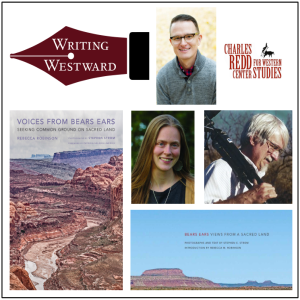
Monday Oct 14, 2019
Monday Oct 14, 2019
Conversation with Rebecca Robinson and Stephen E. Strom about their books, Voices from Bears Ears: Seeking Common Ground on Sacred Land (University of Arizona Press, 2018) and Bears Ears: Views from a Sacred Land (George F. Thompkins Publishing, 2018).
Wednesday Sep 18, 2019
Wednesday Sep 18, 2019
A conversation with Leah Sottile about her Bundyville Podcast and longform journalism. Visit https://longreads.com/bundyville.
Leah Sottile is a freelance journalist whose features, profiles, investigations and essays have been featured by the Washington Post, The New York Times Magazine, Playboy, Outside, The Atlantic, Vice and several others. She is currently the T. Anthony Pollner Distinguished Professor at the University of Montana School of Journalism.
Sottile's National Magazine Award-nominated Bundyville podcast is paired with a textual longform journalism version at Longreads.com and was produced in collaboration with Longread and Oregon Public Broadcasting.
Both the podcast and textual version of Bundyville investigate conflicts over public lands in the American West, federal jursidiction over them, the Bundy ranching family's involvement in a 2014 armed standoff with federal officials in Nevada and the 2016 armed occupation of the Malheur National Wildlife Refuge in Oregon, and the myriad cast of associated characters in the world of patriot, milita, anti-government, religious, and state-seperatist movements.
The multi-chapter textual version of both seasons are available at Longreads.com. The podcast is not a simple recitation of the longform text, but a seperately produced narrative that features interviews and other audio unique to the podcast version. Find it at Longreads.com or anywhere you can subscribe to podcasts.
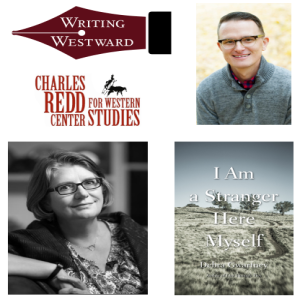
Monday Aug 12, 2019
Monday Aug 12, 2019
A conversation with Debra Gwartney about her book I Am a Stranger Here Myself, published by the University of New Mexico Press in 2019.
Debra Gwartney is a former journalist and current author and memoirst who teaches in the MFA program at Pacific University. I Am a Stranger Here Myself was published in 2019 by the University of New Mexico Press and won the River Teeth Literary Nonfictin Prize. In this book Gwartney pairs the 19th century history of missionary Narcissa Whitman, who was killed in an 1847 massacre by Cayuse Indians, with her own life and complicated relationship with Salmon, Idaho and the West. It is part history and part memoir, and grapples with Western identity, belonging, and coming to peace with the tensions therein.
Gwartney is also the author of Live Through This: A Mother's Memoir of Runaway Daughters and Reclaimed Love (Mariner Books, 2010), which was a finalist for the National Book Critics Circle Award, Pacific Northwest Booksellers' Award, and Oregon Book Award, and coeditor of Home Ground: A Guide to the Americna Landscape (Trinity University Press, 2006).
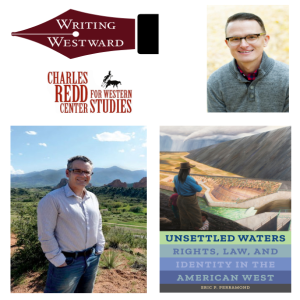
Monday Jul 22, 2019
Monday Jul 22, 2019
A conversation with Eric Perramond about water in the American West and his book, Unsettled Waters: Rights, Law, and Identity in the American West, published by the California University Press in 2019.
Eric P. Perramond is Professor of Environmental Science and Southwest Studies and W.M. Keck Director of the Hulbert Center for Southwest Studies at Colorado College. Unsettled Waters: Rights, Law, and Identity in the American West was published by University of California Press in 2018. His previous books include An Introduction to Human-Environment Geography: Local Dynamics and Global Processes, published by WILEY-Blackwell in 2013, and Political Ecologies of Cattle Ranching in Northern Mexico: Private Resolutions, published by University of Arizona Press in 2010.
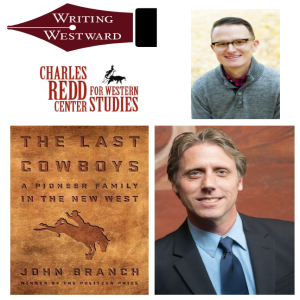
Friday Jun 21, 2019
Friday Jun 21, 2019
A conversation with Pulitzer Prize-winning New York Times journalist, John Branch, about his book The Last Cowboys: A Pioneer Family in the New West.
John Branch is a New York Times sports reporter. Branch's previous work has received considerable acclaim. In 2011 and 2012 he ws a finalist for Pulitzer Prizes in feature writing, and in 2013 his multimedia project "Snow Fall: The Avalanche at Tunnel Creek" on a deadly avalanche in Washington State won the 2014 Pulitzer Prize in Feature Writing. In 2015, his biography, Boy on Ice: The Life and Death of Derek Boogaard, won the 2015 Pen/ESPN Award for Literary Sports Writing.
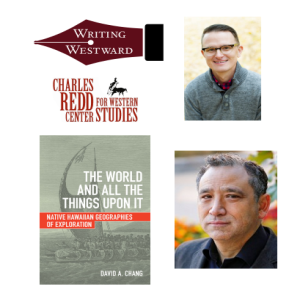
Wednesday May 15, 2019
Wednesday May 15, 2019
Conversation with historian David A. Chang about his award-winning book The World and All Things Upon It: Native Hawaiian Geographies of Exploration, published by the University of Minnesota Press in 2016.
A conversation with David A. Chang about his award-winning book The World and All Things Upon It: Native Hawaiian Geographies of Exploration, published by the University of Minnesota Press in 2016. This book won the Albert J. Beveridge Award for the best book in English on the history of the United States, Latin America, or Canada from 1492 to the present from from the American Historical Association, the John C. Ewers Award for best book in North American Indian Ethnohistory from the Western History Association, the Best Subsequent Book in Native American and Indigenous Studies from the Native American and Indigenous Studies Association, and was a Finalist for the John Hope Franklin Award for Most Outstanding Book in American Studies from the American Studies Association.
David A. Chang is a Distinguished McKnight Professor of History and American Indian Studies at the University of Minnesota. He is also author of the award-winning The Color of the Land: Race, Nation, and the Politics of Landownership in Oklahoma, 1832-1929, published by the University of North Carolina Press in 2010.
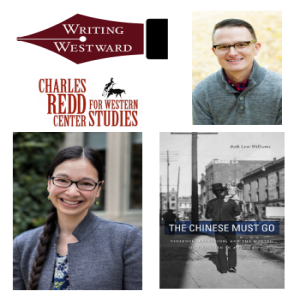
Friday Apr 12, 2019
Friday Apr 12, 2019
A conversation with Professor Beth Lew Williams and her award-winning 2018 book, The Chinese Must Go: Violence, Exclusion, and the Making of the Alien in America (Harvard University Press, 2018)
Beth Lew-Williams is an Assistant Professor and Philip and Beulah Rollins Bicentennial Preceptor in the Department of History at Princeton University. The Chinese Must Go recently won the 2019 Ray Allen Billington Prize and 2019 Ellis W. Hawley Prize from the Organization of American Historians, as well as the 2019 Vincent P. DeSantis Book Prize from the Society for Historians of the Gilded Age & Progressive Era.
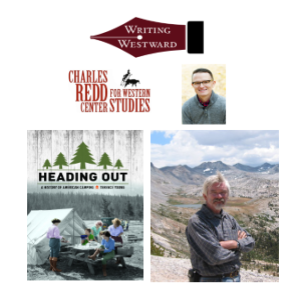
Friday Mar 22, 2019
Friday Mar 22, 2019
A conversation with geographer Terence Young about his book, Heading Out: A History of American Camping (Cornell University Press, 2017)
Terence Young is a professor emeritus of geography at California State Polytechnic University. He has published widely on camping, parks, sustainability, and other topics of the environment, geography, and history. Heading Out won the 2018 Hal K. Rothman Award from the Western History Association for the Best Book of Western Environmental History, and the 2018 J.B. Jackson Prize from the American Association of Geographers. He also published Building San Francisco's Parks: 1850-1930 in Johns Hopkins University Press' "Creating the North American Landscape Series" in 2008.
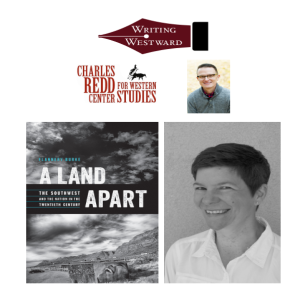
Friday Feb 15, 2019
Friday Feb 15, 2019
A conversation with historian Flannery Burke about her award winning book A Land Apart: The Southwest and the Nation in the Twentieth Century (University of Arizona Press, 2017)
Flannery Burke is Professor of History at Saint Louis University. She holds a Ph.D. and M.A. in history from the University of Wisconsin-Madison and B.A. in history from Bryn Mawr College. Burke is an historian of the environment, the American West, gender and sexuality, and history education. Her recent book, A Land Apart: The Southwest and the Nation in the Twentieth Century, was published in 2017 by the University of Arizona Press in their Modern American West Series. It won the Spur Award for Best Contemporary Nonfiction from the Western Writers of America and the 2017 Southwest Book of the Year Award. Her previous book, From Greenwich Village to Taos: Primitivism and Place at Mabel Dodge Luhan's was published in 2008 in the University of Kansas Press' Culureamerica Series. It won the Ralph Emerson Twitchell Award from the Historical Society of New Mexico, was a finalist for the New Mexico Book Co-op and New Mexico Humanities Council New Mexico Book Prize.
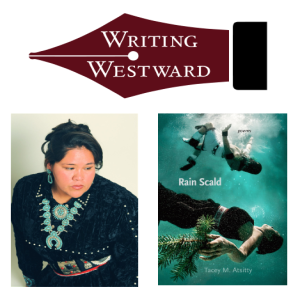
Monday Jan 28, 2019
Monday Jan 28, 2019
A conversation with poet Tacey M. Atsitty about her new collection, Rain Scald: Poems, published by the University of New Mexico Press in 2018.
Atsitty holds undergraduate degrees from Brigham Young University and the Institute for American Indian Arts, and an MFA in Creative Writing from Cornell University. Her work has appeared in multiple collections and journals and earned her such accolades as the Truman Capote Creative Writing Fellowship, the Corson-Browning Poetry Prize, Morning Star Creative Writing Award, and the Philip Freund Prize. She currently serves as the director of Native American programming and events at the This is the Place Heritage Park in Salt Lake City.
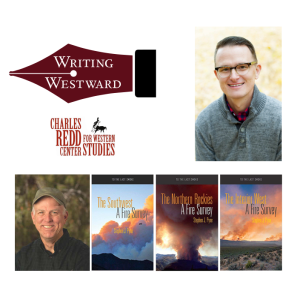
Wednesday Dec 12, 2018
Wednesday Dec 12, 2018
A conversation with historian Stephen Pyne about his ongoing work on the history of Fire in America.
In 2015, the University of Arizona Press published his Between Two Fires: A Fire History of Contemporary America. As companion pieces to that book, his is currently published a 9-volume series entitled "To the Last Smoke." Volumes 1-6 on Florida, California, The Northern Rockies, The Southwest, The Great Plains, and The Interior West are already available. The forthcoming Volumes 7-9 will include The Northeast, Slopovers: Fire Surveys of the Mid-American Oak Woodlands, Pacific Northwest, and Alaska, and a comparative overseas volume entitled Here and There.
Stephen Pyne is a Regents Professor in the School of Life Sciences at Arizona State University. He has published over 30 books. In addition to those discussed above, other noteworthy titles include Fire in America: A Cultural History of Wildland and Rural Fires (University of Washington Press, 1982), The Ice: A Journey to Antarctica (University of Washington Press, 1986), World Fire: The Culture of Fire on Earth (University of Washington Press, 1997), How the Canyon Became Grand: A Short History (Pengiun Books, 1999), and Voyager: Exploration, Space, and the Third Great Age of Discovery (Penguin Random House, 2011).
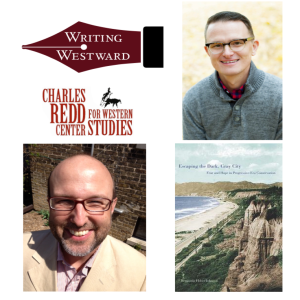
Tuesday Nov 06, 2018
Tuesday Nov 06, 2018
A conversation with Benjamin Johnson about his book Escaping the Dark Gray City: Fear and Hope in Progressive-Era Conservation, published by Yale University Press in 2017.
Benjamin Johnson is an Associate Professor of History at Loyola University in Chicago. He is also the author of Revolution in Texas: How a Forgotten Rebellion and Its Bloody Suppression Turned Mexicans into Americans (Yale University Press, 2003), and Bordertown: The Odyssey of an American Place (Yale University Press, 2008), and editor or co-editor of Steal this University: The Labor Movement and the Corporatization of Higher Education (Routledge, 2003), The Making of the American West (ABC-CLIO, 2007), Bridging National Borders in North America (Duke University Press, 2010), and Major Problems in the History of North American Borderlands (Cengage Learning, 2011).
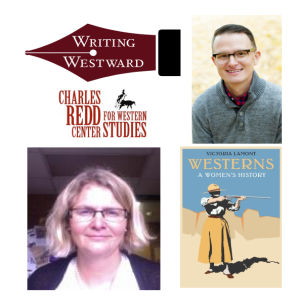
Wednesday Oct 03, 2018
Wednesday Oct 03, 2018
A conversation with Victoria Lamont about her book Westerns: A Women's History, published in 2016 by the University of Nebraska Press as part of the "Postwestern Horizons" Series.
Victoria Lamont is an Associate Professor of English and the Associate Chair of Undergraduate Studies at the University of Waterloo.
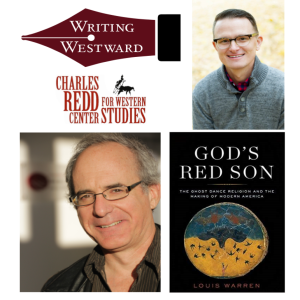
Friday Sep 21, 2018
Friday Sep 21, 2018
A conversation with Louis S. Warren about his book, God's Red Son: The Ghost Dance Religion and the Making of Modern America, published in 2017 by Basic Books and recipient of the 2018 Bancroft Prize.
Louis Warren is the W. Turrentine Jackson Professor of Western U.S. History at the University of California, Davis. He previously authored The Hunter's Game: Poachers and Conservationists in Twentieth-Century America (Yale University Press, 1999), and Buffalo Bill's America: William Cody and The Wild West Show (Vintage Books, 2006).

Show Notes
- Host and Producer Brenden W. Rensink is Associate Director of the Redd Center and Professor of History at BYU, General Editor of the Intermountain Histories project, and author of the 2018 book Native but Foreign: Indigenous Immigrants and Refugees in the North American Borderlands.
- Podcast Music was written and recorded by local Provo composer by Micah Dahl Anderson.
- Episodes are recorded via Skype or in person and amateurishly engineered and produced by Professor Rensink.
- To submit a book to be considered for a podcast episode, email writingwestwardpodcast@byu.edu.









